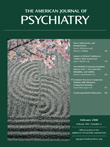Antidepressants and Manic Symptoms
To The Editor: In the September 2007 issue of the Journal , Joseph F. Goldberg, M.D., et al. (1) asserted that the use of antidepressant medications among depressed patients who have some manic symptoms may cause an increase in manic symptoms at 3 months. I have several concerns about the way the data were presented and described. First, the assessment of outcome at 3 months included the Young Mania Rating Scale (2) scores, but the authors did not indicate whether any patients actually had a switch into frank hypomania or mania. Second, in Table 2, data were presented indicating that in the group of non-antidepressant-treated patients, baseline Young Mania Rating Scale scores averaged 13.0 in those patients with no manic symptoms. How could patients free of manic symptoms have such high Young Mania Rating Scale scores, which are actually higher than those in patients with 1 or ≥2 manic symptoms?
Third, in the body of the article, the reference to Table 2 indicated that Young Mania Rating Scale outcomes were presented for those patients with 0, 1, 2, or ≥3 manic symptoms at baseline. However, Table 2 in fact only included these outcome data for patients with 0, 1, or ≥2 symptoms at baseline. The reason I bring this up is that in Figure 3, Young Mania Rating Scale outcomes were presented separately for patients with 2 versus ≥3 symptoms (as well as 0 or 1), and it appeared as though patients with ≥3 baseline manic symptoms actually had lower 3-month Young Mania Rating Scale scores if they were given antidepressants, leading to the appearance that for these more severely mania-ridden patients, antidepressants actually had antimanic effects! Additionally, in that same figure, it appeared that the entirety of the supposed deleterious effect of antidepressants on 3-month Young Mania Rating Scale scores was accounted for by patients with only 1 baseline manic symptom. Patients with 0 or 2 baseline symptoms did not have differential 3-month Young Mania Rating Scale scores based on antidepressant treatment status. This rather odd set of findings seems to cast doubt on the confidence of the authors’ conclusions about antidepressants and manic symptom outcomes.
1. Goldberg JF, Perlis RH, Ghaemi SN, Calabrese JR, Wisniewski S, Miklowitz DJ, Sachs GS, Thase ME: Adjunctive antidepressant use and symptomatic recovery among bipolar depressed patients with concomitant manic symptoms: findings from the STEP-BD. Am J Psychiatry 2007; 164:1348–1355Google Scholar
2. Young RC, Biggs JT, Ziegler VE, Meger DA: A rating scale for mania: reliability, validity, and sensitivity. Br J Psychiatry 1978; 133:429–433Google Scholar



